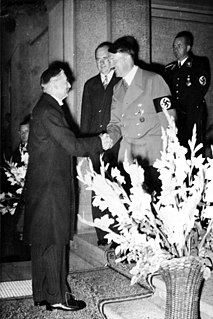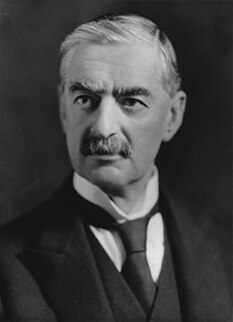 W
WAppeasement in an international context is a diplomatic policy of making political or material concessions to an aggressive power in order to avoid conflict. The term is most often applied to the foreign policy of the UK governments of Prime Ministers Ramsay MacDonald, Stanley Baldwin and Neville Chamberlain in office: 1937-1940) towards Nazi Germany and Fascist Italy between 1935 and 1939. Appeasement of Nazism and Fascism also played a role in French foreign policy of the period.
 W
WRichard Austen Butler, generally known as R. A. Butler and familiarly known from his initials as Rab, was a prominent British Conservative politician.
 W
WNeville Chamberlain formed the Chamberlain war ministry in 1939 after declaring war on Germany. Chamberlain led the country for the first eight months of the Second World War, until the Norway Debate in Parliament led Chamberlain to resign and Winston Churchill to form a new ministry.
 W
WThe European foreign policy of the Chamberlain ministry from 1937 to 1940 was based on British Prime Minister Neville Chamberlain's commitment to "peace for our time" by pursuing a policy of appeasement and containment towards Nazi Germany and by increasing the strength of Britain's armed forces until, in September 1939, he delivered an ultimatum over the invasion of Poland, which was followed by a declaration of war against Germany.
 W
WAs the Spanish Civil War proceeded on the Northern front, the Spanish Republican authorities arranged the evacuation of children, with more regard for ideology than the welfare of the children some of whom had insufficient documentation to enable their repatriation.
 W
WIn the United Kingdom, the interwar period (1918–1939) was a period of peace and relative stability, though of economic stagnation. In politics the Liberal Party collapsed and the Labour Party became the main challenger to the dominant Conservative Party throughout the period. The Great Depression affected Britain less severely economically and politically than other major nations, although some areas still suffered from severe long-term unemployment and hardship, especially mining districts and in Scotland and North West England.
 W
WThis is an incomplete list of Acts of the Parliament of the United Kingdom for the years 1920–1939. Note that the first parliament of the United Kingdom was held in 1801; parliaments between 1707 and 1800 were either parliaments of Great Britain or of Ireland). For Acts passed up until 1707 see List of Acts of the Parliament of England and List of Acts of the Parliament of Scotland. For Acts passed from 1707 to 1800 see List of Acts of the Parliament of Great Britain. See also the List of Acts of the Parliament of Ireland.
 W
WThe second MacDonald ministry was formed by Ramsay MacDonald on his reappointment as Prime Minister of the United Kingdom by King George V on 5 June 1929. It was only the second occasion on which the Labour Party had formed a government; the First MacDonald Ministry held office in 1924.
 W
WBritish re-armament was a period in British history, between 1934 and 1939, when a substantial programme of re-arming the United Kingdom was undertaken. Re-armament was necessary, because defense spending had gone down from £766 million in 1919–20, to £189 million in 1921–22, to £102 million in 1932.
 W
WThe military history of the United Kingdom in World War II covers the Second World War against the Axis powers, starting on 3 September 1939 when Britain and France, followed by most of Britain's Dominions and Crown colonies, declared war on Nazi Germany in response to the invasion of Poland by Germany. Winston Churchill became prime minister and head of a coalition government in May 1940. Despite the defeat of its European allies and the British Expeditionary Force in the first year of the war leading to the Dunkirk evacuation, Britain and its Empire continued the fight alone against Germany. Churchill engaged industry, scientists and engineers to advise and support the government and the military in the prosecution of the war effort. Germany's planned invasion of the UK was averted by its failure to establish air superiority in the Battle of Britain, and by its marked inferiority in naval power. Subsequently, urban areas in Britain suffered heavy bombing during the Blitz in late 1940 and early 1941.